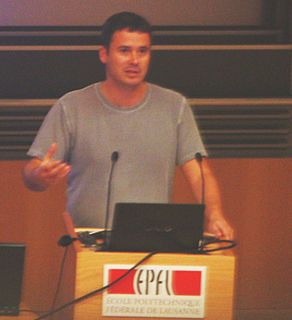A Quote by Robert Lanza
The farther we peer into space, the more we realize that the nature of the universe cannot be understood fully by inspecting spiral galaxies or watching distant supernovas. It lies deeper. It involves our very selves.
Related Quotes
What a dull universe it would be if everything in it conformed to our expectations, if it held nothing to surprise or baffle us or confound our common sense. A century ago no one foresaw the existence of black holes, an expanding universe, oceans on Jupiter's moons, or DNA. What could be more enriching than to know that we share a common origin with all living things, that we are kin to chimpanzees, redwoods and mollusks? And isn't it a source of wonder to realize that the iron in our blood and the calcium in our bones were created in the bellies of supernovas?
We have simply arrived too late in the history of the universe to see this primordial simplicity easily... But although the symmetries are hidden from us, we can sense that they are latent in nature, governing everything about us. That's the most exciting idea I know: that nature is much simpler than it looks. Nothing makes me more hopeful that our generation of human beings may actually hold the key to the universe in our hands - that perhaps in our lifetimes we may be able to tell why all of what we see in this immense universe of galaxies and particles is logically inevitable.
We need to go back to our relationship with nature and understand that those trees are our lungs. The earth is recycling as our body. The rivers are our circulation. This air is our breath. And the star stuff, the carbon, hydrogen, nitrogen that comes from distant galaxies is actually the molecules of your body.
Love is a chemical reaction, but it cannot be fully understood or defined by science. And though a body cannot exist without a soul, it too cannot be fully understood or defined by science. Love is the most powerful form of energy, but science cannot decipher its elements. Yet the best cure for a sick soul is love, but even the most advanced physician cannot prescribe it as medicine.
The Hubbell space telescope, it's first year up after they fixed it, categorized and counted 500 billion galaxies in any one photograph field of view of dark matter. That's like grains of sand at the beach and you've just got a handful. It's massive amounts. I'm sure that of all of the galaxies, and I'm sure the universe is teeming with life.
It's the ground that we walk on, it's where we sit, it's the language that we use. It's a difficult undertaking, but I think without healing that and creating more of a balance between the sexes, we will never have balance globally. I feel like I am going deeper and deeper into this space where I came from that I barely understood.
We live inside our universe and cannot get a bird's-eye view of it from outside. And we cannot even see all of our universe. Distant parts of it are expanding away from us so fast that they are invisible; they go faster than the speed of light. Having bigger telescopes to see fainter stars will not help us here: invisible is truly invisible.




































